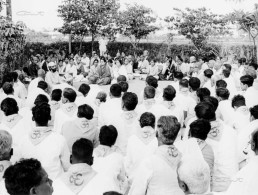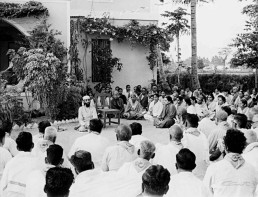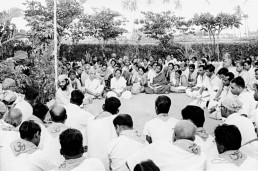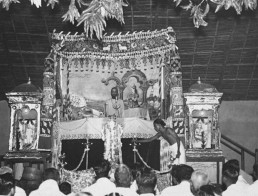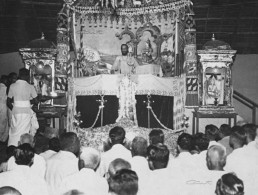
Jnana Yajna 44

Year & Dates:
July 20, 1958 to August 29, 1958

Yajna Topic:
Shrimad Bhagavad Gita- Chapter 18

Place:
Chennai, India.
The skies that poured over Chennai could not dampen the mounting sense of excitement in the four thousand seekers-admirers-disciples inside a spacious Pandal. On the evening of July 20, 1958, after the Governor of Madras, Shri Vishnuram Medhi invoked the Grace of Bhagavan Krishna and said, “May the discourse on Gita bring into bold relief the message of love, tolerance, truth and non-violence,” Pujya Gurudev voiced His inspiring preface: “Why do we seek a greater peace and happiness? Why not be content to be what we are? Something in each one of us tells us that what we have now is not the real peace; we feel that there is some higher peace which is our own. There is a standard in our mind, a vague ideal entertained by our intellect, which is the highest standard. Compared with that ideal peace, unknown – yet, not unknowable – the kind of joys, happiness, and peace we are familiar with seem to be sheer trifles and so mostly valueless.”
Path to Life-Fulfilling Peace
In His first 108 Jnana Yajnas, His 44th Jnana Yajna was the only yajna where He expounded on the final chapter of Shrimad Bhagavad Gita. Before Pujya Gurudev began the Jnana Yajna, He visited the revered Sankaracharya of Kanchi who was staying at the Sanskrit College in Mylapore (a Chennai suburb); the saint was observing silence and Pujya Gurudev offered His prostrations with respect and great humility. Pujya Gurudev’s exposition of Moksha Sannyasa Yoga started on that powerfully silent note. After a masterful outline of the previous 17 chapters, the greatest proponent of the Gita brought out the way to elevate life after progressing from Tamas (inertia) to Rajas (activity) and finally to Sattva (Knowledge). Through noble sacrifice, right understanding, selfless actions, fortitude, and true happiness, liberation in life is achievable, Pujya Gurudev reiterated. Clearly stating that healthy detachment (Tyaga) was required for true renunciation (Sannyasa), He presented the ultimate joy of liberating surrender and the sacred assurance of Bhagavan’s Grace.
The morning sessions of Kenopanishad and Isavasyopanishad were profound. The evening sessions increased the craving to grow noble, egoless, and devoted. To sweeten knowledge with devotion, a Laksharchana Devi Puja with continuous chanting of Lalitha Sahasranama and 100,000 flowers was performed to a beautifully adorned Goddess in the Yajnashala on August 10th. Lotus buds from Kolkata, pure-white carnations from Bengaluru, soft pink roses from Mumbai and garlands of all hues from Trichy, Mangaluru, Delhi, Tripunithura – the flowers came from everywhere and were offered all day by thousands. Pujya Gurudev also conducted an energizing Gita Havana, a highly cherished yatra for Avabhrta Snaana in the holy Kaveri of Sreeranga Kshetra, memorable darshans at the sacred temples of Shree Ranganatha and Sri Jambukeshwara. The finale before returning to Chennai was an exciting climb up the Rockfort hill to worship Bhagavaan Vigneshvara. Pujya Gurudev made everyone experience the liberating peace that passes all understanding in that extraordinary Jnana Yajna.
Photo Gallery
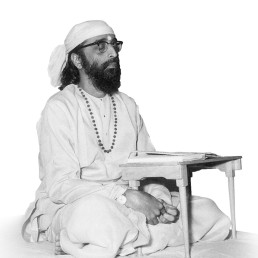
“Think,” Says Pujya Gurudev
In the very symbolism of the Gita-scene, Krishna, the teacher, is a mere charioteer ready to drive the chariot in any direction to which Arjuna, the master, shall command. Krishna bears no weapon; He has no war to wage. He has nothing to gain or lose in the fields of Kurukshetra. Yet, it is His duty to bring to the notice of His ‘master’ certain points of view, certain varieties which Arjuana seems to have not cared to recognize, or has overlooked because of the peculiar mental condition in which he was then. Having placed before him all the facts and figures of life, principles and methods of living, Krishna rightly invites Arjuna to make his own independent decision after considering all these points. Spiritual teachers should never compel. And in India, there has never been any form of indoctrination.
From Bhagavad Gita- Chapter 18, Book
Abandonment vs. Renunciation
Swami Chinmayananda in his inimitable style sheds light on the common confusion between “abandonment” and “renunciation” and their psychological nuances. through introspective contemplation, learn how letting go of desires and expectations leads to the transcendence of ego, paving the way for spiritual realization.
